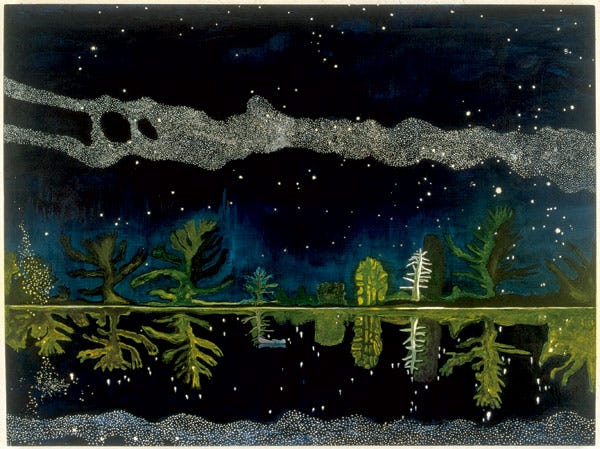flow
letting go of control
When I was in high school, I held a firm belief that everyone got what they wanted. The idea was that if you wanted something badly enough, every atom of your being was coalesced toward the attainment of the thing. It was a comforting belief for someone who had mostly academic goals, worked hard, and was relatively privileged. There was a predictability to life. Even though I didn’t always know why I wanted what I wanted, the formula seemed to work. If I didn’t get a thing, it was because I didn’t want it badly enough.
I had my first heartbreak in college, and suddenly, I couldn’t have what I wanted. I tried everything to recover what was lost. Nothing worked. Then, I fell in love again, and the same thing happened. And so I learned there was a whole sphere of things outside my control, typically involving other people.
A new friend introduced me to the concept of “conditions for emergence.” The idea is that there are certain activities you can’t control like sleep. You can’t force yourself to fall asleep the way you can make yourself pick up a fork. You can only create the conditions for sleep to emerge: turning off the lights, getting into bed, putting away your phone, closing your eyes.
You can’t make someone love you. You can only create the conditions for love to grow. I’m learning to let go when it comes to other people. As much as I love them, as much as I want them to believe certain things to be true, as much as I want them to see the beauty in the world that I see, I can’t make them. I could try, but it would only push them farther away. Another belief I hold true: there is a dynamic in human relationships where the harder you push someone to see/believe/feel the way you do, the more they retreat. And even if you succeeded, would it be coming authentically from them or would it be a concession to appease you?
What makes love difficult is that you have an idea of what’s good, and you want the person you love to embrace this idea. Yet, the harder you try to convince them, the less successful you are. It’s particularly painful when they persist in behaviors or modes of thought that are detrimental to their wellbeing and flourishing.
I fell in love with a man who insisted on living in the present. The future, he said, wasn’t something he liked to think about because he was afraid of not getting what he wanted or disappointing other people. Orienting his life around the present seemed safer: living in the moment, making spontaneous decisions, not thinking too far ahead. He wasn’t always like this (otherwise, we never would’ve made it past the first date). Somewhere over the course of falling in love, deep-rooted fears were triggered, and he retreated into himself. It hurts to see someone you love live their life out of fear, clinging onto what’s safe and familiar. He says he’s happy, but is it happiness or the mirage of happiness, the shadows on the walls of Plato’s cave? Comfort, not happiness?
I could’ve retreated into my shell after my nth heartbreak and refused to fall in love again because one day I would get hurt again. I could’ve insisted that finding a partner, starting a family, wasn’t for me because I didn’t want to lose my independence or I wanted to focus on my writing or I wanted to live in the present. I could’ve come up with all sorts of reasons to avoid emotional intimacy. But the truth is, you can have independence and be committed to someone. You can be an artist and a parent. You can live in the present and plan for the future. You don’t have to lose an identity in order to gain one. We are multifaceted, kaleidoscopic. Our capacity for being is infinite.
But you can’t force someone to believe this. They have to believe it themselves. They have to come to their own realization about what’s good in the world and what’s holding them back from attaining it. You can create the conditions for growth and change, but you can’t make someone grow and change.
With the people I love, I’m learning to let things happen through me instead of created by me. It’s scary, this letting go of control, especially for an anxious Type A. But I know that the best chance I can give someone to grow authentically into their best self is time and space. To be clear, it’s not about waiting for them to change. It’s about time and space in the truest sense: expansive, boundless. Waiting implies an expectation, and expectations have a peculiar way of pushing people farther away. It’s also not about giving up on them. You can love someone deeply, truly as they are, but still hope for them to become their best self. This applies not just to lovers but to parents, children, siblings, friends.
One final belief: True authorial control is knowing when to let go of an idea. Every fiction writer with some experience understands this. My characters always do things that surprise me. I have an idea of how their stories will pan out, and it never happens exactly as planned. What actually happens when I let their stories organically unfold on the page is a thousand times better than what I envisioned: It’s less straightforward, more meandering, but more authentic, more honest and true to their nature, and consequently, more beautiful. I can’t force my protagonist to run for the hills if she insists on digging her heels in; I can’t force her lover to repent if his ego will not make room for shame. In the end, I’m not the god of them. I’m just the vessel through which their stories are told in the truest way possible.



